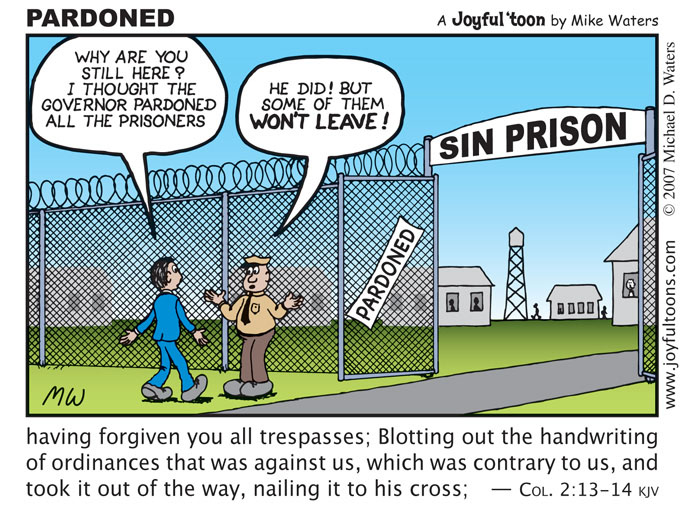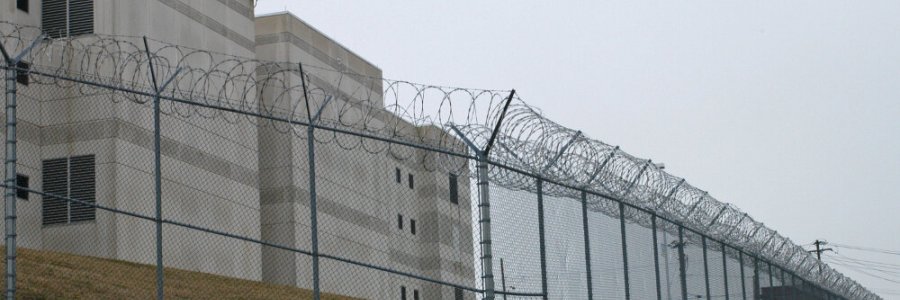Christian Liberty: A license to moral bondage?
In 1838, on the night when the slaves were set free in Jamaica, a large mahogany coffin was made and a grave was dug.
Into that coffin the liberated slaves threw the reminders of their former life of slavery--whips, torture irons, branding irons, coarse frocks and shirts, large hats, fragments of a treadmill, and handcuffs. Then the lid of the coffin was screwed down.
At the stroke of midnight the coffin was lowered into the grave and buried. Then the liberated natives sang the doxology:
Praise God from whom all blessings flow,
Praise Him, all creatures here below,
Praise Him above ye heavenly host,
Praise Father, Son, and Holy Ghost!1
How exciting it must have been for these slaves to have been made free! Those of us who know Jesus Christ as our Savior and Lord know this feeling in a spiritual sense. To be free from sin and death through the blood of Jesus Christ is indeed marvelous.
However, I am afraid that many professing Christians in the church are not acting like free people. They are not burying the reminders of their captivity as these slaves did, but rather, they are seeking to be in bondage again. And ironically, they are using their freedom as an excuse to do so. Benjamin Franklin once said, "Those who give up essential liberty to purchase a little temporary safety deserve neither liberty nor safety." I believe the church is giving up their liberty that they claim to have in Christ for temporal pleasure in sin.
When someone tells you, "I have Christian liberty to watch Game of Thrones," or, "I have the freedom in Christ to watch this or that vile movie," they have it completely backwards. They are not free; they are still in bondage to sin. The world constantly gets the idea of freedom wrong; "If it feels good, do it," they say. "Follow your heart," they say, in the context of living sinfully. In the name of freedom, they are increasingly submitting to their taskmaster of sin (John 8:34). I believe Paul had this general idea in mind when he wrote:
Galatians 5:13 - For, brethren, ye have been called unto liberty; only use not liberty for an occasion to the flesh, but by love serve one another.
Jesus spoke of freedom from sin:
John 8:34 - Jesus answered them, Verily, verily, I say unto you, Whosoever committeth sin is the servant of sin.
35 - And the servant abideth not in the house for ever: but the Son abideth ever.
36 - If the Son therefore shall make you free, ye shall be free indeed.

Perhaps you've heard someone jokingly say of a rebellious teenager, "He wanted to get away from all the rules at home, so he joined the army!" The army has strict rules of its own in order to develop discipline in its soldiers, so joining it to get away from rules doesn't make much sense. Many in the church want to get away from what they consider to be all the "rules" of godliness, and so they abandon holy living. But unlike joining the U.S. army, which is for a good and honorable cause, they are yielding to the armies of Satan; and unlike the U.S. army, which develops strong and knowledgeable soldiers, they are submitting themselves to the cruel taskmaster of sin, which delights in making its servants spiritually weak. The saddest part is that they do so in the name of liberty.
I would like to discuss three analogies of freedom to better understand our Christian liberty:
- The experienced pilot: Free to explore
- The skilled architect: Free to invent
- The pardoned prisoner: Free to live
1: The experienced pilot: Free to explore
First, as Christians, we have the freedom to explore, like the freedom of a pilot as he soars through the sky. Can you imagine flying through the air wherever you choose? It must be amazing. In IMAX's film The Magic of Flight, a few pilots describe their joy and freedom in the air:2
[Speaking of landing a fighter jet on an aircraft carrier] Every time I come out...my knees are still shaking, my heart's pounding a thousand miles an hour, and it takes a while to calm yourself down; but you go out there the next time just fired up and ready to get after it because it's what we all love to do. -- Scott Anderson, Blue Angels Pilot #4
My airplane is just a wonderful sky-dancing machine. It's fabric, and I can feel the sky through that airplane, just like when you're sailing with a tiller, and you're holding on to the sheet, you can feel the air through that rope. When I'm holding on to that stick I can feel that air and I can bounce through the sky... -- Sean D. Tucker, Aerobatic Champion (Stunt Flyer)
And I think everybody loves the idea of flying. Everybody loves the idea of being able to fly like a bird, or having the freedom to soar above the waves or the ocean. And I think there's also a fear of flying too, so there's this part of us that wants to conquer that. But the rewards are so great that when you do master it, and you are flying like a bird, you're free. That's why I love it. -- Patty Wagstaff

Let's ask a question that may seem ridiculous: Does an experienced pilot have the freedom to aim his or her air vessel toward the side of a massive rocky cliff and fly right into it? Does he or she have the freedom to intentionally put the plane into an uncontrolled freefall and refuse to recover it, crashing on the ground below? "What a silly question," you may respond. That would be the opposite of freedom. The moment freedom is used to bring about catastrophe, it ceases to be freedom.
Similarly, many church members talk about their freedom to "explore" in the wrong way. They believe they should be allowed to sample the things of the world, and sometimes they even make the argument that doing so increases their discernment as they can decide for themselves what is right or wrong. Do you need to eat a piece of rotten meat to know it will harm your body? Do you need to walk off the edge of a cliff to know, for yourself, that it is unwise? Of course not, and neither do we need to sample Satan's wickedness to know to should keep away. Christian freedom doesn't mean browsing through all the corridors of Netflix. Moral liberty isn't sampling all the devilish movies at the theatre. As Christians, we have the freedom to explore, but this does not include the freedom to explore sin, for then we are brought back into bondage, the exact opposite of the freedom we claim.
2: The skilled architect: Free to invent
Second, as Christians, we have the freedom to invent, like the freedom of a skilled architect drawing up plans for an exciting new building. Experienced architects have a lot of liberty in their building designs. Aside from certain permits, an architect is limited only by the laws of physics and his or her personal ingenuity. All sorts of interesting buildings exist all over the world.
For instance, a company that handcrafts baskets of maple wood used to have an old headquarters building that looked like a basket:3

And another building in China looks like a piano and glass guitar:4

Let's pose a hypothetical scenario which may seem ridiculous. What if an architect went to a general building contractor with some drawings and asked, "Do you think you could build this?"
The contractor skims over the plans and with a worried look says, "What about this stairway? It dead ends."
"Oh, does it?" says the architect; "Well, I'm free to do whatever I want in these drawings. Your job is just to build it."
The contractor finds several other objections. "These floor joists are too small; they'll never support all the weight. And what is this monstrosity of boards and bricks in the center? These are the worst plans I've ever seen. This would look terrible."
"Look, I'm the architect. I can draw whatever I want. No rules are going to hold me back."
Obviously, an architect has great freedom, but he cannot abandon basic physics and logic. Those are not rules that hold him back; they are rules that help him move forward.
Similarly, we have great freedom in Christ to invent. Christians through all ages of church history have composed beautiful songs for God, and the Bible says to "sing unto the LORD a new song" (Psalm 98:1). Christians have used creativity in finances, administration, art, evangelism, and technology. But many in the church have the attitude of this fictional architect when it comes to their "freedom." When they come up with songs that sound sinful or videos which are not morally clean, they say that they're just "being themselves," or that nothing is going to hold them back. I read about an exhibit somewhere (I think in some church) that had a very offensive sacrilegious display of a Star Wars character hanging on a cross. I believe they defended themselves by saying it was "art" and it was meant to be provocative and get people to think. That's just wrong. Freedom doesn't mean we can blaspheme Jesus' death or come up with things that are perverted or evil. That is spiritual bondage, which is supposed to be what Jesus has freed us from.
3: The pardoned prisoner: Free to live
Third, we have the freedom to live, like the freedom of a prisoner which has just been pardoned. What a joy it must be for a prisoner to be able to enjoy all the little things that he missed in prison. He can now go where he wants when he wants, eat at restaurants, attend church, enjoy a nature hike, and do so many other things that were absent in prison or just not the same.
Again, let's ask a seemingly silly question: Does this pardoned prisoner have the freedom to drive up to his old jail, find a way to break into the highly secure area, and march to an empty cell and lock himself in? No, of course not. The freedom to live does not mean the freedom to choose bondage. The moment such a person falsely believes so is the moment he loses his freedom. And the moment a church member says he has the spiritual freedom to lock himself into the dungeons of Satan is the moment he loses the very thing he claims to have: freedom in Christ. Satan must laugh at such deception.

Are you voluntarily locking yourself into Satan's prison by what you choose to hear and see in entertainment? So many movies are gruesome and bizarrely dark. Are you fascinated by death and intrigued by darkness? These are not liberties; they are sickly infections that we must ask God to cure in us. Don't claim liberty as an excuse to lock yourself into Satan's dungeons.
Conclusion
Many in the church have it backwards when it comes to freedom in Christ. They say they have the freedom to listen to acid rock music from satanic rock groups, to watch TV shows about homosexuality, or read demonic books. Because Christian liberty is being free from sin, not free to sin, such reasoning is self-contradictory. I think much of the problem is that many churchgoers have not been truly converted, and so they are still in bondage; and they are grasping for any reason to justify the fact that they are still there--including an imagined liberty in Christ to be where they are. Of course, genuine Christians also need to be careful, since entertainment which does not please God will vex our souls. I think as we get closer to God, we realize more clearly the entertainment which does not please God and that which does. But II Peter 2:19 sums up the contradiction of liberty and bondage, speaking of false teachers:
II Peter 2:19 - While they promise them liberty, they themselves are the servants of corruption: for of whom a man is overcome, of the same is he brought in bondage.
These principles aren't adding "rules" to our freedom; rather, they are simply defining what freedom essentially is. We don't "restrict" a pilot by telling him he cannot fly into the side of a cliff, and we don't "restrict" a pardoned prisoner by saying he cannot lock himself back up in jail; rather, we are asking him not to restrict himself. Likewise, when we teach standards of godly living, if those standards are in line with the principles of the Bible, then we are not "restricting" anyone; we are simply asking them to avoid placing themselves into spiritual bondage, which is every bit as real as physical bondage. Claiming freedom to be entertained by sin makes about as much sense as saying a pardoned prisoner has the freedom to walk back into jail and lock himself in. It is an oxymoron, and one of the greatest contradictions of terms in modern church theology. Let's shun this deceptive doctrine and keep our hearts pure.
-
Tan, Paul Lee, 15,000 Illustrations, Bible Communications, Inc., Dallas Texas, c1998; ISBN 0-932940-11-0; p. 914, #4067 ↩
-
IMAX, The Magic of Flight, c1996. Image courtesy of the motion picture. ↩
-
https://en.wikipedia.org/wiki/The_Longaberger_Company, accessed 2018 March ↩
-
https://www.homedit.com/piano-house-in-china/, accessed 2018 March ↩
